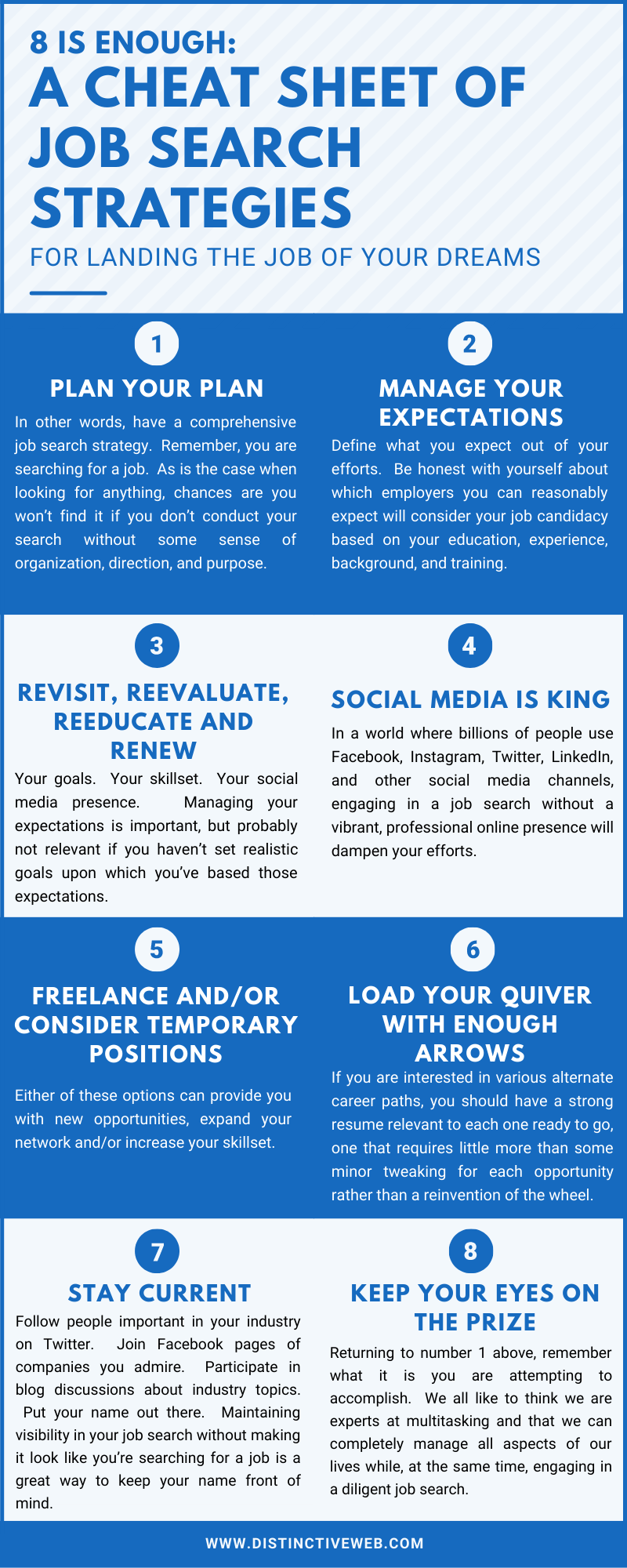
If you’re determined to land the job of your dreams, just thinking about changing jobs, or simply curious about what career alternatives might be out there for you, there is never a better time than the present to start planning job search strategies and launch a job search.
There is, of course, a seemingly endless array of suggestions, tips, and shortcuts designed to help you in your job search. Not all of them are efficient and even fewer are truly effective.
There are, however, some job search tools that are so helpful it’s almost not fair that more people don’t use them. Here, then, is a list of job search strategies, a cheat sheet for you to follow as you pursue your dream career.
1) Plan your plan
In other words, have a comprehensive job search strategy. Remember, you are searching for a job. As is the case when looking for anything, chances are you won’t find it if you don’t conduct your search without some sense of organization, direction, and purpose. Looking for a job without a well-planned job search strategy will likely lead to frustration, disorganization, and, not surprisingly, no new job.
2) Manage your expectations
What is the purpose of your search? A new job? Leverage or options in relation to your current job? Whichever it is, be sure you are clear about your goals. Define what you expect out of your efforts. Be honest with yourself about which employers you can reasonably expect will consider your job candidacy based on your education, experience, background, and training. If your job search is targeted at an industry that is saturated with qualified talent, you’ll probably be frustrated to no end if you’re not patient. Identify a growth industry if your expectation is that you’ll have several, if not many, job opportunities.
3) Revisit, reevaluate, reeducate and renew
Your goals. Your skillset. Your social media presence. Managing your expectations is important, but probably not relevant if you haven’t set realistic goals upon which you’ve based those expectations. If your skills are a bit rusty or it’s been some time since you’ve worked on updating them, now would be a good time. Classes offered by community colleges and local business associations offer you not only the opportunity to refine your competencies but to network as well. Online courses are a convenient and relatively inexpensive way for you to grow your toolbox of knowledge and abilities.
4) Social media is king
In a world where billions of people use Facebook, Instagram, Twitter, LinkedIn, and other social media channels, engaging in a job search without a vibrant, professional online presence will dampen your efforts. Here are a few tips:
a) Be sure your professional profiles are up to date and error-free;
b) Have a consistent online presence that is socially acceptable–if your Facebook page includes posts or pictures that unsuitable for a recruiter to see, either delete the content or restrict access to your page and test the restrictions to satisfy that they are sufficient;
c) Edit and edit again. Is your content relevant? It is accurate? Is it important? Will it help build your personal brand or distract from the professional persona you are trying to convey?
d) Use your social networking accounts to communicate with peers, friends in the industry, and to interact with the social media pages of companies and industry groups of interest to you.
One caveat, however: Don’t post publicly. Send a private message or email or use the IM function. Remember, what happens on the Internet stays on the Internet. You have absolutely no control over what someone who accessed information you posted on your public page or the page of one of your contacts does with that information.
5) Freelance and/or consider temporary positions
Either of these options can provide you with new opportunities, expand your network and/or increase your skillset. Freelancing, for example, allows you to test out various career options without the burden of making a full commitment or leaving your current job without knowing whether the new one is something that’s right for you.
6) Load your quiver with enough arrows
If you are in the midst of a job search, you may already have a resume or cover letter that you believe is ready to use. Frequently, however, job seekers make the mistake of putting too much confidence in a resume format that “is good enough.”
If you are interested in various alternate career paths, you should have a strong resume relevant to each one ready to go, one that requires little more than some minor tweaking for each opportunity rather than a reinvention of the wheel.
Your battle-ready toolbox should also include a list of at least three to six references that you know are solid and who will be able to speak to your qualifications relevant to the position for which you are applying. Contact information (including email addresses) should be updated before you submit any references. Nothing says lack of preparation quite like providing the name of a reference for which the contact information you gave is no longer valid.
7) Stay current
Follow people important in your industry on Twitter. Join Facebook pages of companies you admire. Participate in blog discussions about industry topics. Put your name out there. Maintaining visibility in your job search without making it look like you’re searching for a job is a great way to keep your name front of mind.
As well, by sharing your opinions, ideas, and knowledge with industry professionals, you are, in essence, providing those individuals samples of your work product and establishing an environment wherein you establish your bona fides for a position before it even becomes available. What if, rather than you engaging in a job search, the job actually searches for you? Take this tip seriously and you may find yourself hunted for a coveted new job in the months to come rather than doing the hunting yourself.
8) Keep your eyes on the prize
Returning to number 1 above, remember what it is you are attempting to accomplish. We all like to think we are experts at multitasking (never mind that studies consistently show otherwise) and that we can completely manage all aspects of our lives while, at the same time, engaging in a diligent job search.
We can’t.
You may think you can but, really, you can’t.
So focus on the search while you are conducting the search. Pay attention to detail. Take inventory of your efforts on a regular basis so that you can identify what’s working and, of equal importance, what isn’t and should, therefore, be scrapped.
If you are making mistakes but don’t know it, you’ll be the only one who doesn’t and your job search efforts will die on the vine, so to speak, without you ever having a clue as to why. No matter how good your job search strategies and plan are.
There’s only one you. There are, however, many potential jobs for you, even some that ideally suit your abilities, goals, even your professional desires. Rest assured, however, that there are countless individuals competing for those same jobs.
If you want to land your dream job, your job search strategies should include steps designed to organize your efforts, build your personal brand, and enhance your prospects. We might call our list of suggestions a “cheat sheet”, but you’ll benefit from incorporating these suggestions into an honest job search effort. This could be your year!










